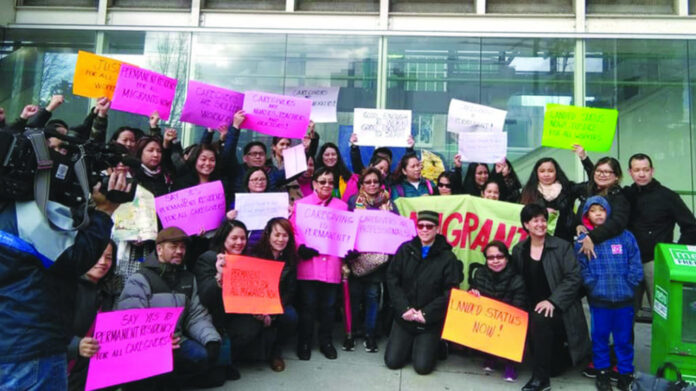“What do we want?” “Landed Status!” “When do we want it?” “Now!”
Organized by the Filipino Canadian Advocacy Network (FILCAN), a huge crowd of caregivers, including former caregivers, migrant advocates, lawyers, service providers, and union allies, with MLA Mable Elmore of Vancouver Kensington and MP Don Davies of Vancouver Kingsway marched, chanted and held their street action outside the busy Joyce Skytrain Station. Marchers held high their coloured signs, distributed leaflets, and speakers from the caregivers and other sectors expounded on the most recent announcement from the government.
The rallyists came from the Caregiver Campaign Community meeting at the BC Federation office where they discussed the recent announcements last February from Immigration, Refugee and Citizenship Canada (IRCC) and made plans on future actions for the campaign. The immediate issue points to the Caregiver Pathways which was introduced in 2014 and replaced the Live-In Caregiver Program. The Caregiver Pathways Program is set to expire on Nov 29, 2019.
The IRCC declared that the Caregiver Pathways was under review. The letters and statements of alarm, concern and protest from caregivers and their advocates prompted the Minister to issue a response that “Canada is not shutting down any caregiver programs” and described the Caregiver Pathways as a “pilot project” — a term that was not at all used in 2014 but is now used to describe the Caring for Children and the Caring for People with High Medical Needs Pathways.
Caregivers groups and coalitions across Canada wrote IRCC Minister Ahmed Hussen and expressed their concern and alarm about the announcements and about those caregivers who arrived a couple of years ago who may not be able to complete the Program requirements before the government deadline. Local groups in Vancouver signed on to a joint letter asking for an in-person consultation with IRCC Minister Hussen; these were the FILCAN, Migrante BC, Committee for Domestic Workers and Caregivers Rights, the Migrant Workers Centre and the Victoria Filipino Canadian Caregivers Association. The growing public outcry prompted another announcement from the IRCC Minister that there will always be a “pathway” to permanent residency for caregivers.
Lina Vargas of FILCAN and a former caregiver decried the closed door “consultations” with select groups instead of open and genuine public consultations with the people most affected by this review, i.e. the caregivers, and supporters from all sectors. Joy Torres of Migrante BC raised the demands for “Landed Status for caregivers, for open work permits or sectoral work permits instead of closed work permits, and the chance of bringing our children, partner or spouse with us.” She also linked the caregivers’ struggles to the Philippine’s labour export policy which has pushed women and men to work abroad and also because of poverty, lack of decent jobs, and landlessness back home.
MLA Mable Elmore of Vancouver Kensington and MP Don Davies of Vancouver Kingsway reiterated their strong support for the issues of the caregivers and raised the slogan of “Good enough to work, good enough to stay”, and most especially the call for landed status upon arrival. Other speakers included representatives from the Migrant Workers Centre (formerly the West Coast Domestic Workers Association), the Community Office of MLA Elmore, the Committee for Domestic Workers and Caregivers Rights.
Lina Vargas, a former caregiver and a FILCAN representative added that, “For a genuine review, a national consultation is needed to ensure the views of caregivers are heard. Already, many are anxious about the uncertainty surrounding the announcement of the end of the “pilot” and we fear the “review” may mean even more restrictions to permanent residency.”
The IRCC does not seem to have thought about its announcement and has confused the public, especially the caregivers when it says that the programs will “expire” on November 29, 2019 and then in the same breath declare that it is not “shutting down any caregiver programs.” There is no explanation offered on what caregivers who may not have the time to complete their 24 months of required caregiving work by the deadline in November are supposed to do. Maybe the IRCC should have conducted the open, genuine and transparent consultations with the caregivers themselves and other sectors before making this announcement.
The Caregiver Program with the two streams of Caring for Children and Caring for People with High Medical Needs replaced the Live-in Caregiver Program; this Program has new and higher language, education, and medical requirements for PR applications. There are caps on the number of PR applications and these are set at 2,750 per stream annually. So the Minister’s assurance of “there will always be a pathway to permanent residency for caregivers” does not assure the caregivers at all.
The “pathway” he is trying to sell to us is riddled with potholes, obstacles, and barriers. The “pathway” is narrower, longer and crooked, and money has to be paid at points along the way. Caregivers walking on this “pathway” will find it difficult, maybe impossible, and even if the caregivers reach the end of the “pathway” armed with all the required papers for language, medical and education, they may be told at the end of the road that “sorry, the quota for this year has been reached”.
So much for the promised pathway. The Minister should not be promising a “pathway.” It should be saying “Permanent residency or landed status upon arrival.” The labour done by caregivers (and migrant worker) is not temporary and permanent immigration for caregivers recognizes that caregiving work is important and the demand for caregiving is permanent.
No pathways, Minister Hussen. Yes to landed status, Minister Hussen.



